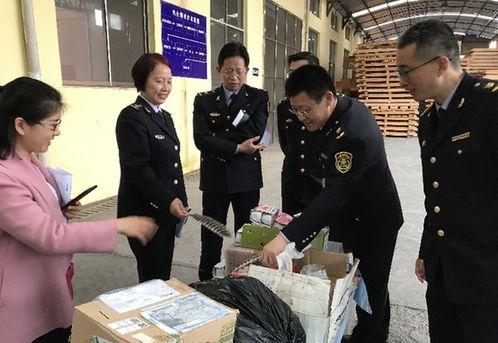National biosecurity is related to the people's food, clothing, shelter and transportation. On November 13, the Nanjing Inspection and Quarantine Bureau of Jiangsu Province launched a "National Gate Sale Ban" campaign in Jiangning, focusing on the destruction of a total of 267 kilograms of prohibited imported goods intercepted from the carry-ons, mailings and separate operations of passengers since the beginning of this year. At the event site, bird's nest, flower glue, sea cucumbers, aquatic animals, meat, eggs and their products, milk and dairy products and other animals and animal products are prohibited from entering the country by the staff into the incinerator.

"These are all seized by us from the carry-ons, mail or separate baggage of passengers arriving at airports, post offices, ports in accordance with relevant regulations." Wang Shuiming, director of the Nanjing Airport Inspection and Quarantine Bureau, said that from January to October this year, 4426 batches of imported materials intercepted at the Nanjing Airport Port were detected, and 824 batches of various pests were detected, of which 27 batches of quarantine pests were detected, and the data was basically the same as that of the same period last year. Pests include the U.S.-Australian type of drucanocarbon brown rot, African mango fruit fly, mango strip fruit fly, orange small fruit fly, ocean rump mealybug, mango core weevil. Among them, the detection of harmful organisms in Tokyo Bay big-eyed peles from soap pods carried by inbound passengers was the first time in China.
According to Zhu Guangyao, director of the Port Office of the Nanjing Inspection and Quarantine Bureau, the Nanjing Port Office intercepted 196 batches of prohibited imports in the sub-operation of inbound passengers, totaling 333.2 kilograms, and intercepted more than 30 kinds of prohibited imports, mainly canned lunch meat, dried fish, dried shrimp, dairy products, black beans, red beans, kidney beans, etc. Of which fish glue, placenta plus hydrolysate were intercepted for the first time in the separate transport of passengers carried by the Port Office of the Nanjing Bureau.
From January to October, a total of 373 kinds of pests of various types were detected at the Nanjing Postal Inspection Port, including 2 kinds of quarantine pests and 5 kinds of pests. Yin Lianping, deputy director of the Post Office of the Nanjing Inspection and Quarantine Bureau, said that for the first time, 10 endangered plant varieties such as yellow bottle grass from the Czech Republic were intercepted. For the first time, the Nanjing port intercepted the sweet potato small elephant shell. In addition, the harmful fungus microsporium polyspore was intercepted for the first time in the country.
In recent years, the Nanjing Inspection and Quarantine Bureau has continued to promote the standardization of infrastructure, customs clearance inspection, and law enforcement services at ports, continued to carry out the "Green Bud" special action, cracked down on illegal carrying and mailing of plant seeds and seedlings into the country, improved and improved the "human-machine-dog" comprehensive inspection model, strengthened the linkage between travel postal inspection and law enforcement and criminal justice, increased the investigation and punishment of illegal personnel, strengthened the supervision of quarantine treatment, and strictly prevented the introduction of the epidemic.
The inspection and quarantine reminds the general public not to carry items that are explicitly prohibited from entering the country when returning home, so as not to accidentally become an "accomplice" of "stowaways". In addition, for the intercepted prohibited imports, the inspection and quarantine department shall return them or destroy them within the relevant provisions within a time limit. Perishable and deteriorated items such as fresh fruits and vegetables, meat products, aquatic animals, and dairy products are generally sent to the Animal and Plant Food Center of Jiangsu Entry-Exit Inspection and Quarantine Bureau for harmless treatment after inspection; valuable and easy-to-preserve items with low risk are generally returned to the party within a time limit to reduce the economic losses of the parties. (Liu Guochao, Gao Ying)